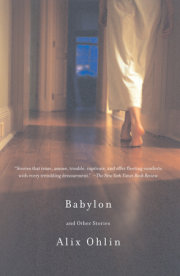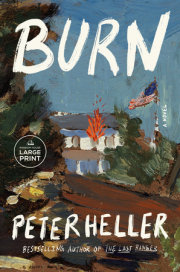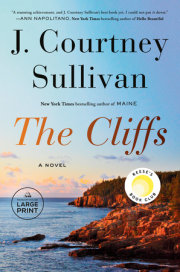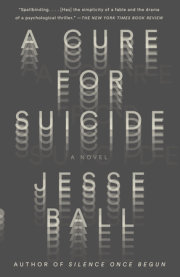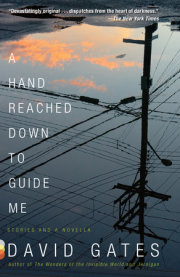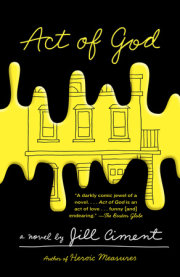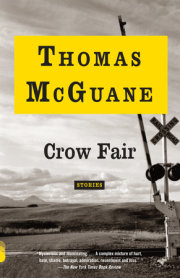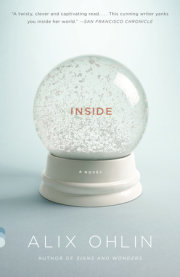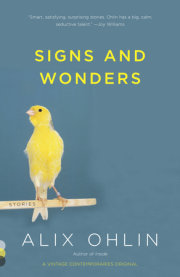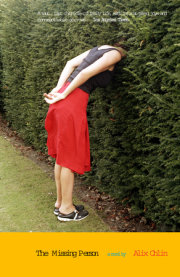The King of Kohlrabi
It was a summer of disasters. I was sixteen and just starting to relax fully into my vacation when my father took my mother and me out to dinner at the New Chinatown and told us over the Kung Pao chicken that he’d fallen in love with his law partner, Margaret, and the two of them were “going away for a while” to “sort things out.” While he was talking, he twisted a corner of the tablecloth into a ring in his right hand. My mother, leaning back in the corner of the booth, said, “Oh, for crying out loud.” She sounded annoyed. She was drinking a Mai Tai, as usual, and had given me the umbrella, also as usual. Tonight’s was blue and I twirled it between my fingers. I was always pleasantly surprised that it really opened and closed, just like a real umbrella. I stuck it into a piece of my chicken and moved some baby carrots and water chestnuts into an arrangement around it, like small, edible patio furniture. No one said anything. I stared at the couple at the table next to us, who were sharing a Volcano, holding hands over the blue flame in the center of it. They saw me looking and loosed their hands as if they were embarrassed.
“You know how much I love you both,” said my dad. My mother and I didn’t say anything to this. Margaret had been at our house for Christmas that year. She was a quiet, large-boned woman with a wide, dark mouth and I’d always thought she was a lesbian.
“I thought she was a lesbian,” I said.
“Well, she’s not,” said my dad.
I drove home from the New Chinatown. I had just gotten my driver’s license but my parents wouldn’t let me take the car anywhere without them. My mom always sat in the front passenger seat, making a big show out of white-knuckling the armrest and covering her eyes when she thought I was being reckless. My father sat in the back seat and whistled. He was a good whistler, and that night he did an up-tempo rendition of “I Get a Kick Out of You.”
I looked at him in the rearview mirror and wondered if he was so happy with Margaret the lesbian that he couldn’t stop being happy, even for just a few minutes, even for us. Then a guy came out of nowhere in a red Toyota Corolla, turning in front of me off a side street with a stop sign. I don’t know what he was thinking.
“Aggie!” yelled my mother, gripping the dashboard.
“It’s not my fault,” I said quickly, and braked hard, too hard I guess, and the car skidded to the left; the right front fender of our car collided with the side of the Toyota. The driver, steam pouring from under his hood, got out and started walking around the dark street, clutching his arm and howling. Next to me my mother began to cry in a dry, sharp way, jaggedly inhaling. These two noises, my mother’s and the driver’s, were the only two sounds, the night otherwise quiet. We all sat there breathing. My father whistled the first few notes of “Be Careful, It’s My Heart.”
This was the second disaster.
The next day my father packed a suitcase and left for Santa Fe, where he and Margaret had sublet an apartment for the summer. She came to pick him up in her Saab and they drove away together, leaving our crumpled Honda in the driveway. I watched from the bedroom window but didn’t say good-bye. As soon as they were out of sight, my mother walked into my room without knocking and plopped herself down on the bed.
“Things are going to be different around here now that your father’s gone, Aggie,” she said severely. “You’ll be giving up your pampered life of leisure.”
“What?” I said. I had planned to spend the summer learning to play the bass guitar so I could start an all-girl punk band—and it was a good plan, except I didn’t own a bass guitar and had no money to buy one—but Mom said I’d have to get a job instead. I wasn’t thrilled by this idea. My two best friends were waitressing, and they kept calling, in the middle of their shifts, asking me to remind them never to do it again.
“No, seriously,” said my friend Karen, calling from the pay phone at Shoney’s. “I’m going to have a bruise the size of a quarter where this guy pinched my butt. I mean, you should see him, Aggie. His fingers are like
cigars.”
Lucy, my other friend, was working as a hostess at a place where she had to dress up as a pirate, with an eye patch and everything. When people from school drove by the restaurant she ducked behind the counter, whether there was a customer there or not. If anybody got upset she’d say, “Sorry! It’s that peg leg of mine acting up again.”
I put off the job search for as long as possible, but it wasn’t easy. Every night, before she fixed dinner, my mother would fling the cupboard doors wide open and sigh dramatically. “I guess I can eke something out of the meager supplies I have here.”
“We aren’t going to starve, Mom.”
She’d shake her head. “I don’t know, Aggie. You know what I make.” She was a substitute teacher. She made next to nothing during the school year and exactly nothing in summer. “I mean, who knows if we’ll ever see your father again.”
“Mom, he’s an hour away. It’s not like he absconded to Mexico.”
“So far as you know.”
She’d send me to the grocery store with twenty dollars and tell me to get enough food for the week. While I was gone, she hung around the living room building tall houses out of the L.A. IS FOR LOVERS cards I’d brought back from our last family vacation, three or four levels high, stretching across the whole dining room table. When I got back she’d blow on the structure and say, “See? Everything just collapsed like a house of cards.” This was her favorite joke.
“Mom, I feel like you’re not handling this very well.”
“Well, thank you for your honesty, Aggie.”
“Why don’t you get out of the house or something? See your friends?”
“Sure I will! I’ll invite everyone out for a fancy dinner! And what I’ll do is, I can use the money you’ve made in your new job.”
At this point we usually declared a truce and ordered out for pizza.
One night at Smith’s I was weighing two pounds of potatoes—“It worked for the Irish,” my mom had said, “and it can work for us. Just pray there’s no famine, Aggie”—when a man came up to me and said, “Excuse me, miss, what do you think of this kohlrabi?”
“I don’t work here, sorry,” I said.
He shook his head quickly. He was a short man, probably around five-three or five-four, with longish gray hair and tanned, stocky arms. “I know you don’t,” he said. “I’m asking you as a consumer. I need an impartial opinion. My wife wants me to bring home some kohlrabi, and it has to be perfect. If you knew her you’d know what I mean. The way she cooks it is so succulent, it’s just wonderful. She’s the Queen of the Kohlrabi. You should come by and meet her sometime. Anyway, if I don’t get the good kohlrabi I’m a dead man. So please, what do you think?”
The vegetable he was holding up looked like some kind of alien spaceship, with four or five long stems shooting out from a little pod in the middle. At the ends of the stems were green leaves that trembled gently in his hands.
“I’ve never eaten kohlrabi,” I said. I’d never seen it before, either. “So I have no basis for comparison.”
“You don’t eat kohlrabi? Why? Do you have something against it? Is there something I should know?”
“Look, I’m young, I just haven’t gotten around to it yet,” I said, and started edging away from the produce section.
He followed me. “I’m sorry, I’m sorry, I didn’t mean to offend you.” He seemed sincere, if slightly insane. “Look, a fresh eye is good. It doesn’t matter if you’ve never eaten any. Just look at it and tell me what you think.”
I picked it out of his hand and felt it briefly, cupping the pod in my palm like a baseball. The whole thing was a little strange and I glanced over at the canned-goods aisle, mapping an escape route in case it turned ugly. “Well, I’m no expert,” I finally said, “but this one seems a little . . . limp.”
“Limp?”
“Just a little.”
“Oh my God, you’re right,” he said, taking the kohlrabi back and staring at it. “You are just exactly right. Thank you so much. Really, you’ll never know what you’ve done for me tonight.”
“Okay,” I said.
We shook hands, and I wheeled my cart away. I didn’t even know what kohlrabi tasted like or how you cooked it—this was the kind of thing I would’ve asked my dad, if he were around to ask. But he wasn’t. I finished up the shopping and was standing in the express line when the man came up behind me. I didn’t have many items in my cart, and nothing fancy. His was full of kohlrabi and gourmet cheeses.
“This is very crisp,” he whispered. “I think she’s going to be happy, my wife.”
“Good,” I said.
“You eat very plainly,” he said.
“We live in an age of austerity,” I told him.
He looked surprised. “We do?”
“Well, my mother and I do,” I said. She told me this all the time. I started putting the groceries on the conveyor belt. It was what my mom called peasant food, or life’s necessities. I couldn’t help staring at the decadent foods, like Pop Tarts and Ruffles, that other people had in their carts.
He nodded. I looked over at him and saw that his gray T-shirt and jeans were neatly ironed.
“I’m Mr. Dejun,” he said.
“Aggie.”
We shook hands and shuffled forward in line.
He unloaded his kohlrabi behind my stuff. “So what do you do with yourself when you aren’t coming to the aid of strangers in grocery stores, Aggie?”
“Well, right now, I’m supposed to be looking for a job.”
“Is that right?” said Mr. Dejun. “What kind of job? Can you type?”
I didn’t see why not. “I guess so.”
“I’d like to hire you, Aggie,” he said. “I could use someone with your outgoing personality and discriminating eye for produce. Come see me tomorrow.” He pulled a business card out of his jeans, and I put it in my pocket, then we shook on the deal.
I was at his office by nine the next morning. His company, Dejun Enterprises, Inc., was a private environmental testing firm. They tested just about everything you could think of—water, soil, air, machinery, fabrics, textiles, even once, he confided, condoms. As soon as I got there Mr. Dejun took me on a tour of the place, through all the labs where technicians in white coats hovered over long orange counters covered with Bunsen burners and petri dishes and test tubes, just like the labs at school.
“Listen, if you can think of something that needs to be tested, we’ll test it for you. That’s our attitude here at Dejun Enterprises, Inc. We test things that have never been tested before, and we test ’em cheaper than anybody else. Never turn a job down. Listen, Aggie, I’ve been in business for a long time, and one thing I’ve learned is that you
always have to be willing to take the customer’s money. Got it?”
“Got it,” I said.
He led me down hallways and into the employee lounge. I was completely disoriented, but somehow we wound up back in the reception area. There was a frowning, wrinkled woman sitting at the desk wearing a headset, apparently to leave her hands free for smoking. Her ashtray was full of cigarette butts. Next to the desk was a free-standing fishtank. Its water looked alarmingly gray, and I wasn’t sure whether there were fish in it or not.
“Sophia, you’re free,” said Mr. Dejun. “The cavalry is here.”
“Yippee,” said Sophia, not moving.
“She loves me,” Mr. Dejun told me.
“She’s a young one, isn’t she,” said Sophia.
“Hi, I’m Aggie,” I said, and shook her hand. She didn’t really shake back.
Mr. Dejun said, “Sophia is actually not the receptionist, she’s our accounts payable czaress. She is the Diva of Debts, aren’t you, darling?”
“Sure,” said Sophia.
“She loves me. The point being, Aggie, that she’s just filling in because we had to, ah, part with the receptionist. But now we have you for the summer and we don’t have to hire a new receptionist until fall. Isn’t it great, Sophia?”
“Good morning, Dejun Enterprises,” said Sophia. She lit a cigarette and blew the smoke at Mr. Dejun.
“What happened to the receptionist?” I said. I caught a movement out of the corner of my eye and saw some fish emerging from behind the plastic plants of the tank. They looked okay in spite of the secondhand smoke.
“She was a terrible liar. Are you a good liar?”
“Pretty good, I guess,” I said.
“Only pretty good?”
“Actually, I’m an excellent liar. The ‘pretty good’ part was a lie.”
Mr. Dejun tilted back his head and laughed. His long gray hair was stiff and bristly and maintained its shape when it moved, like a cloud formation. I could see the backs of his teeth.
“You know, I’m really starting to get a kick out of you, young Aggie. Now listen. We get a lot of calls here, a
lot of calls. And we can’t always take them, right? We’re only human, and there are only so many hours in a day. So sometimes we’ll come to you and say, ‘If so-and-so calls, I don’t want to talk to him, tell him I’m in a meeting.’ Now if I were to say that to you, what would you do?”
“Tell him you’re in a meeting.”
“Excellent! That is exactly the right answer. You’re brilliant, Aggie. You are really terrific.”
“What did the old receptionist say?”
“It turned out that she was a very devout woman who refused to lie. She’d say, ‘Yes, he’s here, but he doesn’t want to talk to you right now.’ Nothing about meetings. You’ve got to respect her integrity, but man-oh-man did we have a lot of pissed-off people on the phone.”
Copyright © 2006 by Alix Ohlin. All rights reserved. No part of this excerpt may be reproduced or reprinted without permission in writing from the publisher.


